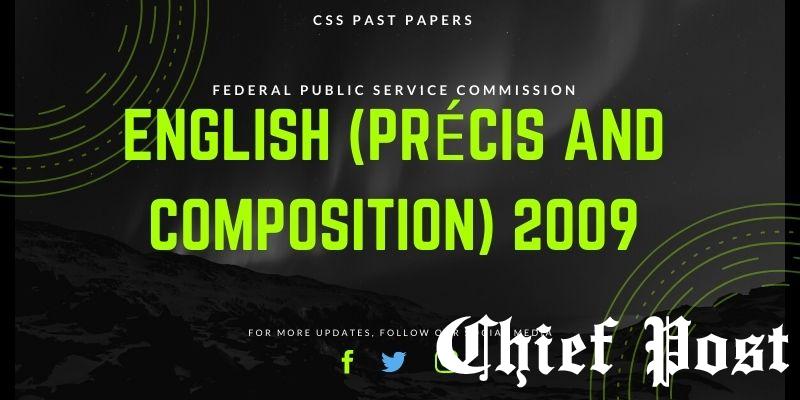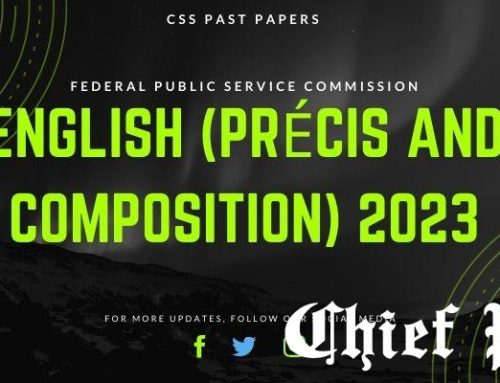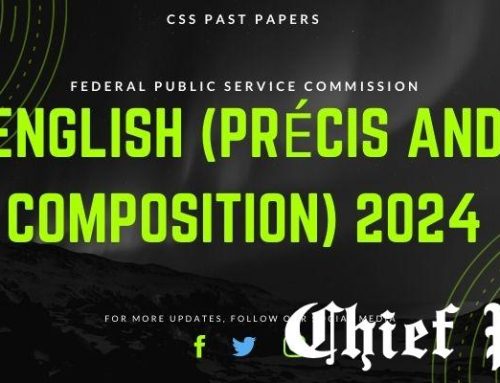
English Précis and Composition 2009
Q.1.(a) Choose the word that is nearly similar in meaning to the word in capital letters. (5)
(Do only FIVE) Extra attempt of any Part of the question will not be considered.
(i) OBSCURE
(a) unclear (b) doubtful
(ii) AMIABLE
(a) obnoxious (b) affable
(iii) HOODWINK
(a) delude (b) avoid
(iv) GUILEFUL
(a) honourable (b) disingenuous
(v) OBSESSION
(a) fixed ideas (b) delusion
(vi) RADICAL
(a) innate (b) moderate
(vii) PRESUMPTIVE
(a) credible (b) timid
(b) Pick the most nearly opposite in meaning to the capitalized word: (5)
(viii) PRESENTABLE
(a) unable (b) scruffy (c) suitable (d) personable
(ix) SALVATION
(a) escape (b) starvation (c) doom (d) rescue
(x) PLAIN
(a) clean (b) distinct (c) ambiguous (d) frugal
(xi) ODIOUS
(a) porus (b) charming (c) horrid (d) offensive
(xii) INFLAME
(a) calm (b) anger (c) excite (d) kindle
NOTE: (i) PART-II is to be attempted on the separate Answer Book.
(ii) Attempt ALL questions from PART-II.
Q.2 Make a precis of the given passage and suggest a suitable heading. (20+5)
From Plato to Tolstoi art has been accused of exciting our emotions and thus of disturbing the order
and harmony of our moral life. “Poetical imagination, according to Plato, waters our experience of lust and
anger, of desire and pain, and makes them grow when they ought to starve with drought. “Tolstoi sees in art a
source of infection. “Not only in infection,” he says, “a sign of art, but the degree of infectiousness is also the
sole measure of excellence in art.” But the flaw in this theory is obvious. Tolstoi suppresses a fundamental
moment of art, the moment of form. The aesthetic experience – the experience of contemplation – is a
different state of mind from the coolness of our theoretical and the sobriety of our moral judgment. It is filled
with the liveliest energies of passion, but passion itself is here transformed both in its nature and in its
meaning. Wordsworth defines poetry as “emotion recollected in tranquility”. But the tranquility we feel in
great poetry is not that of recollection. The emotions aroused by the poet do not belong to a remote past. They
are “here”-alive and immediate. We are aware of their full strength, but this strength tends in a new direction.
It is rather seen than immediately felt. Our passions are no longer dark and impenetrable powers; they
become, as it were, transparent. Shakespeare never gives us an aesthetic theory. He does not speculate about
the nature of art. Yet in the only passage in which he speaks of the character and function of dramatic art the
whole stress is laid upon this point. “The purpose of playing,” as Halmet explains, “both at the first and now,
was and is, to hold, as, twere, the mirror up to nature; to show virtue her own feature, scorn her own image,
and the very age and body of the time his form and pressure.” But the image of a passion is not the passion
itself. The poet who represents a passion does not infect us with this passion. At a Shakespeare play we are
ENGLISH (Precis & Composition)
Page 2 of 2
not infected with the ambition of Macbeth, with the cruelty of Richard III, or with the jealousy of Othello. We
are not at the mercy of these emotions; we look through them; we seem to penetrate into their very nature and
essence. In this respect Shakespeare’s theory of dramatic art, if he had such a theory, is in complete agreement
with the conception of the fine arts of the great painters and sculptors.
Q.3. Read the following passage and answers the questions that follow. (20)
It is in the very nature of the helicopter that its great versatility is found. To begin with, the helicopter
is the fulfillment of one of man’s earliest and most fantastic dreams. The dream of flying – not just like a bird
– but of flying as nothing else flies or has ever flown. To be able to fly straight up and straight down – to fly
forward or back or sidewise, or to hover over and spot till the fuel supply is exhausted.
To see how the helicopter can do things that are not possible for the conventional fixed-wing plane,
let us first examine how a conventional plane “works.” It works by its shape – by the shape of its wing, which
deflects air when the plane is in motion. That is possible because air has density and resistance. It reacts to
force. The wing is curved and set at an angle to catch the air and push it down; the air, resisting, pushes
against the under surface of the wing, giving it some of its lift. At the same time the curved upper surface of
the wing exerts suction, tending to create a lack of air at the top of the wing. The air, again resisting, sucks
back, and this gives the wing about twice as much lift as the air pressure below the wing. This is what takes
place when the wing is pulled forward by propellers or pushed forward by jet blasts. Without the motion the
wing has no lift.
Questions:
(i) Where is the great versatility of the helicopter found?
(ii) What is the dream of flying?
(iii) What does the wing of the conventional aircraft do?
(iv) What does the curved upper surface of the wing do?
(v) What gives the wing twice as much lift?
Q.4. Write a comprehensive note (250 – 300 words) on any ONE of the following: (20)
(i) The importance of industrialization.
(ii) Do we live better than our forefathers?
(iii) Protecting freedom of expression not lies.
(iv) Adopting unchecked Western life style.
(v) Variety is the spice of life.
Q.5.(a) Change the narration from direct to indirect or indirect to direct speech. (Do only FIVE) Extra
attempt of any Part of the question will not be considered. (5)
(i) He said to him, “why do you waste your time?”
(ii) He ordered his servant not to stand there doing nothing.
(iii) He exclaimed with joy that he had won the match.
(iv) The traveler said, “What a dark night?”
(v) He said, “Let it rain even so hard, I will start today.”
(vi) My mother said, “May you live happily and prosper in your life.”
(vii) He said, “How foolish have I been?”
(b) Correct ONLY FIVE of the following: (5)
Extra attempt of any Part of the question will not be considered.
(i) He swore from God
(ii) Is your dress different than mine?
(iii) He inquired whether I live in Karachi.
(iv) He spoke these words upon his face.
(v) They ran direct to their college.
(vi) I shall not come here unless you will not call me.
(vii) They have been building a wall since three days.
(viii) He does not have some devotion to his studies.
Q.6.(a) Use ONLY FIVE of the following in sentences which illustrate their meaning: (5)
Extra attempt of any Part of the question will not be considered.
(i) Leave in the lurch. (ii) Hard and fast. (iii) Weather the storm.
(iv) Bear the brunt. (v) Meet halfway. (vi) Turncoat.
(vii) Where the shoe pinches.
(b) Use ONLY FIVE of the following pairs of words in sentences which illustrate their meaning: (10)
Extra attempt of any Part of the question will not be considered.
(i) Persecute, Prosecute (ii) Luxuriant, Luxurious (iii) Mean, Mien
(iv) Observation, Observance (v) Naughty, Knotty (vi) Ghostly, Ghastly
(vii) Hew, Hue (viii) Hoard, Horde










